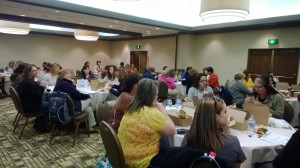
BPA is a toxic chemical that has been linked to increased rates of breast cancer among women in many job sectors, including food packing. (Infographic by the BlueGreen Alliance & UFCW)
Even today, women who work in middle-class jobs across America face pronounced barriers and gender discrimination in the workplace, as exemplified by the recent Demos report on gender inequality in retail wages. However, workplace inequality can manifest in other, more subtle ways – such as the manufacture of products containing Bisphenol-A, or BPA.
BPA is an endocrine disrupting chemical, which alters hormone production and behavior, disrupting the body’s normal functions. In a 2012 six-year study, BPA was found to have a pronounced effect on women who work in the automotive plastics and the food packaging industries.
These women are five times more likely to have breast cancer than women who work in other industries.
BPA, which is found in the epoxy lining of the metal food can and released into the air during the food canning process, was banned by the FDA in the manufacture of baby bottles, sippy cups and infant formula packaging. Many private companies have taken further steps to remove BPA from products. However, BPA exposure is still a problem for thousands of manufacturing and packaging workers in America.
In order to address this problem, the UFCW has joined allies such as the Communications Workers of America, the United Steelworkers, and the United Automobile Workers in supporting the Ban Poisonous Additives Act, or the BPA Act.
The BPA Act would remove BPA from food packaging, encourage the development of safe alternatives, and ensure a thorough safety review of all currently used substances in food and beverage containers. It is currently in committee in the House, where it needs to be passed by the House and the Senate and approved by the President before it becomes a law.
This brochure, produced by the BlueGreen Alliance and UFCW, contains useful information about the growing problem of breast cancer among working women.

